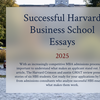Over a hundred faculty members and students attended a largely anti-war teach-in yesterday against the backdrop of President Bush’s claim that today will be “a moment of truth for the world.”
Meeting with the leaders of Britain and Spain in the Azores, Bush called today the final deadline for the U.N. to endorse the use of force against Iraq.
In Cambridge, John P. Marquand Professor of English Peter Sacks warned teach-in participants not to be “the servile objects of an administration...the most arrogant administration that’s ever been in the White House.”
Sacks, Boylston Professor of Rhetoric and Oratory Jorie Graham, Lecturer on the Study of Religion Brian C.W. Palmer and four others led the “Teach-In on War and Peace,” which was meant to encourage open discussion on issues surrounding the impending war in Iraq.
“We decided we needed to plan something quickly before bombs started to drop,” said Timothy P. McCarthy ’93, a teaching assistant in history and literature and an organizer of the teach-in.
McCarthy and others said that the impetus for the teach-in grew out of student interest.
“A number of students came up to us and suggested this,” said Associate Professor of English John Stauffer, who co-teaches English 176a: American Protest Literature with McCarthy.
“It started the wheels turning, and there seems to be a lot of interest among faculty and students to have conversations about the prospect of war,” Stauffer said.
“We’d like to have at Harvard more opportunity for students and faculty to come together for open, honest, face-to-face discussions on the conflict in Iraq, to discuss the impact on our country and on the world,” McCarthy said.
Students involved in planning the teach-in said that it was also intended as a response to a shocking lack of knowledge about the war on campus.
Regina C. Schwartz ’06 said that as she tried to discuss the war with her classmates in recent weeks, “a lot of students expressed the fact that they’re disillusioned, and didn’t know what to believe in the media.”
“There are so many conflicting ideas and arguments out there, but no real dialogue,” she said.
The teach-in began with a moment of silence in remembrance of those who had lost their lives in war and, according to McCarthy, “for those lives that stand precariously on the brink of war, including our own.”
The seven speakers gave brief talks on war generally and the conflict in Iraq which were followed by an hour-long discussion with students.
Graham warned students not to depend on U.S. news sources.
“I don’t think you can rely on American news media at present,” Graham said. “You’ll get sanitized news. All [American] news media have agreed to have its news filtered by the government.”
She urged students to look to the BBC, Le Monde and other international news sources to “get a more complicated picture, more complicated than that Fox News will give you.”
Sacks said that everyone in the room was “on the verge of war not just against Iraq, but against us.”
He said that Americans must not allow themselves to be intimidated by the Bush administration.
“Pride is driving a group of people who think this is a world that is theirs to take,” Sacks said.
Americans should not “be frightened by such terms as patriotism, a term being cynically used at this moment by people...who are greedy.”
Palmer called the teach-in “one moment of hope on an otherwise very gloomy evening.”
He criticized the Harvard culture in which students are faced with “such a stressed environment and... exhaustion by competition which dampens political discourse.”
In addition to the statements, Niles X. Lichtenstein ’05 delivered a spoken word performance against the war.
During the discussion period, one student spoke in favor of the war. But many others responded by questioning the Bush administration’s motives and by pointing to a history of imperialism in U.S. foreign policy.
According to McCarthy a series of events will take place throughout the spring to promote even more dialogue about the war.
McCarthy said he hopes in the future to incorporate the voices of those who are undecided or pro-war.
“The biggest challenge is how to sustain this conversation as war unfolds,” McCarthy said. “The key to hope for peace is to continue to have these discussions.”
—Staff writer Margaretta E. Homsey can be reached at homsey@fas.harvard.edu.
Read more in News
Math Whizzes Forgo Z's To Take Prestigious Title












